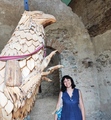Studying at the University of Verona
Here you can find information on the organisational aspects of the Programme, lecture timetables, learning activities and useful contact details for your time at the University, from enrolment to graduation.
Academic calendar
The academic calendar shows the deadlines and scheduled events that are relevant to students, teaching and technical-administrative staff of the University. Public holidays and University closures are also indicated. The academic year normally begins on 1 October each year and ends on 30 September of the following year.
Course calendar
The Academic Calendar sets out the degree programme lecture and exam timetables, as well as the relevant university closure dates..
| Period | From | To |
|---|---|---|
| First half of Semester 1 | Sep 25, 2017 | Nov 11, 2017 |
| Second half of Semester 1 | Nov 13, 2017 | Jan 20, 2018 |
| First half of Semester 2 | Feb 26, 2018 | Apr 21, 2018 |
| Second half of Semester 2 | Apr 23, 2018 | Jun 9, 2018 |
| Session | From | To |
|---|---|---|
| Sessione d'esame invernale | Jan 22, 2018 | Feb 24, 2018 |
| Sessione d'esame estiva | Jun 11, 2018 | Jul 28, 2018 |
| Sessione d'esame autunnale | Aug 27, 2018 | Sep 22, 2018 |
| Session | From | To |
|---|---|---|
| Sessione estiva | Jul 16, 2018 | Jul 21, 2018 |
| Sessione autunnale | Nov 12, 2018 | Nov 17, 2018 |
| Sessione invernale | Apr 1, 2019 | Apr 6, 2019 |
| Period | From | To |
|---|---|---|
| All Saints Day | Nov 1, 2017 | Nov 1, 2017 |
| Immaculate Conception | Dec 8, 2017 | Dec 8, 2017 |
| Christmas break | Dec 22, 2017 | Jan 7, 2018 |
| Easter break | Mar 30, 2018 | Apr 3, 2018 |
| Liberation Day | Apr 25, 2018 | Apr 25, 2018 |
| Labour Day | May 1, 2018 | May 1, 2018 |
| Patron Saint Day | May 21, 2018 | May 21, 2018 |
| Republic Day | Jun 2, 2018 | Jun 2, 2018 |
| Summer break | Aug 13, 2018 | Aug 18, 2018 |
Exam calendar
Exam dates and rounds are managed by the relevant Culture and Civilisation Teaching and Student Services Unit.
To view all the exam sessions available, please use the Exam dashboard on ESSE3.
If you forgot your login details or have problems logging in, please contact the relevant IT HelpDesk, or check the login details recovery web page.
Should you have any doubts or questions, please check the Enrollment FAQs
Academic staff
 augusto.barbi@univr.it
augusto.barbi@univr.it

Bassetti Massimiliano
 massimiliano.bassetti@univr.it
massimiliano.bassetti@univr.it
 045802 8376
045802 8376
 evita.calabrese@univr.it
evita.calabrese@univr.it
 marco.dallavalle@univr.it
marco.dallavalle@univr.it
 fatima.elmatouni@univr.it
fatima.elmatouni@univr.it
Hatzikiriakos Alexandros Maria
 alexandrosmaria.hatzikiriakos@univr.it
alexandrosmaria.hatzikiriakos@univr.it
Kaczko Sara
 francesco.lupi@univr.it
francesco.lupi@univr.it
Maganuco Anna Maria Grazia Rita
 anna.maganuco@univr.it
anna.maganuco@univr.it

Mastrocinque Attilio
 attilio.mastrocinque@univr.it
attilio.mastrocinque@univr.it
 +39 045802 8386
+39 045802 8386
 linda.napolitano@univr.it
linda.napolitano@univr.it
 giulia.pedrucci@univr.it
giulia.pedrucci@univr.it
 dino.piovan@univr.it
dino.piovan@univr.it
 alberto.scandola@univr.it
alberto.scandola@univr.it
Tani Stefano
 stefano.tani@univr.it
stefano.tani@univr.it
 +39 045802 8110
+39 045802 8110
 sonia.trovato@univr.it
sonia.trovato@univr.it
 carlo.vannini@accademiabelleartiverona.it
carlo.vannini@accademiabelleartiverona.it
 gianmaria.varanini@univr.it
gianmaria.varanini@univr.it
Study Plan
The Study Plan includes all modules, teaching and learning activities that each student will need to undertake during their time at the University.
Please select your Study Plan based on your enrollment year.
1° Year
| Modules | Credits | TAF | SSD |
|---|
To be chosen between2° Year activated in the A.Y. 2018/2019
| Modules | Credits | TAF | SSD |
|---|
Latin literature (i)
To be chosen between2 courses to be chosen between2 courses to be chosen between3° Year activated in the A.Y. 2019/2020
| Modules | Credits | TAF | SSD |
|---|
To be chosen between3 courses to be chosen between| Modules | Credits | TAF | SSD |
|---|
To be chosen between| Modules | Credits | TAF | SSD |
|---|
Latin literature (i)
To be chosen between2 courses to be chosen between2 courses to be chosen between| Modules | Credits | TAF | SSD |
|---|
To be chosen between3 courses to be chosen between| Modules | Credits | TAF | SSD |
|---|
Legend | Type of training activity (TTA)
TAF (Type of Educational Activity) All courses and activities are classified into different types of educational activities, indicated by a letter.
Italian literature (p) (2019/2020)
Teaching code
4S01344
Teacher
Coordinator
Credits
12
Language
Italian
Scientific Disciplinary Sector (SSD)
L-FIL-LET/10 - ITALIAN LITERATURE
Period
Sem 1A, Sem 1B
Learning outcomes
"KNOWLEDGES:
The aim of the course is to learn the historical path of Italian literature, especially from the seventeenth century to the Unification of Italy, with special regard to texts and contexts, influences and codifications. It also intends to provide information on the critical bibliography and on the essential tools for the interpretation of structures and literary forms.
SKILLS:
The course aims to develop, through targeted methodological approaches, adequate analytical and argumentative skills in reading the literary texts of the Italian tradition, especially from the seventeenth century to the unification of Italy."
Program
Prerequisites: Complete knowledge of the former Italian literary tradition (from the beginning to the Sixteenth Century) is required; before taking Letteratura Italiana Exam (p), students must have passed the Letteratura Italiana exam (i) for 12 cfu.
Course content: For the introductory part: presentation of the main movements and authors of the Italian literary tradition from Seventeenth Century to Italian Unification (1861) making reference to exemplary texts.
The second part of the course will be dedicate to: Vittorio Alfieri tragedy. Analysis of Saul, Antigone, Mirra.
Reference Texts: For the introductory part: Gino Tellini, Letteratura italiana. Un metodo di studio, Firenze, Le Monnier Università, (the section: Dalla Nuova Scienza all’epica risorgimentale). Students will complete this study with a selection of the main authors of our literary tradition from Seventeenth Century to Italian Unification (available in e-learning platform). Worktexts will be suggested during the lectures.
Non attending students will demonstrate to be able to analyze:
G.B. Marino: a passage from Adone;
G. Galilei: a passage from Saggiatore or Dialogo sopra i due massimi sistemi del mondo;
C. Goldoni: choise of one act of any comedy play;
G. Parini: one ode and one passage from Il Giorno;
V. Alfieri: one act of Mirra and one passage from Vita;
U. Foscolo: two sonnets and one section of Dei Sepolcri;
G. Leopardi: three cantos and one choise from Operette morali;
A. Manzoni: one poem and one passage from I Promessi Sposi;
A written list of the students choises must be shown during the exam.
The students, attending and not attending, who had not entered any exam of "Modern and contemporary Italian literature" (L-FIL-LET / 11) in their study plan have the possibility (NOT the obligation) to integrate the program of exam with Gino Tellini, Letteratura italiana. Un metodo di studio, Firenze, Le Monnier University, pp. 337-589. This additional information will be communicated to the teacher at the time of the exam.
For the second part of the exam:
Complete reading of Vittorio Alfieri, "Saul", "Antigone", "Mirra". It is suggested the edition: Vittorio Alfieri, Tragedie, a cura di Bruno Maier, Milano Garzanti.
One of the following texts (two for non attending students):
Gabriella Fenocchio, Alfieri, Bologna, il Mulino, 2012;
Giacomo Debenedetti, Vocazione di Vittorio Alfieri, Milano, Garzanti, 1995;
Arnaldo Di Benedetto-Vincenza Perdichizzi, Alfieri, Roma, Salerno editrice, 2014;
Vincenza Perdichizzi, Lingua e stile nelle tragedie di Vittorio Alfieri, Pisa, ETS, 2009;
Alfieri tragico, a cura di Enrico Ghidetti e Roberta Turchi, numero monografico della «Rassegna della Letteratura italiana», 107, s. IX, 2, luglio-dicembre 2003.
Teaching methods: Lectures and reading and text interpretation exercises. Seminars and papers. The teaching materials proposed are consistent with the exam program.
| Author | Title | Publishing house | Year | ISBN | Notes |
|---|---|---|---|---|---|
| Arnaldo Di Benedetto- Vincenza Perdichizzi | Alfieri | Salerno editrice | 2014 | ||
| Gabriella Fenocchio | Alfieri | il Mulino | 2012 | ||
| Enrico Ghidetti- Roberta Turchi (cur.) | Alfieri tragico | Le lettere | 2003 | numero monografico della «Rassegna della Letteratura italiana», 107, s. IX, 2, luglio-dicembre 2003 | |
| Vincenza Perdichizzi | Lingua e stile nelle tragedie di Vittorio Alfieri | ETS | 2009 | ||
| Vittorio Alfieri | Tragedie | Garzanti | 2015 | a cura di Bruno Maier | |
| Giacomo Debenedetti | Vocazione di Vittorio Alfieri | Garzanti | 1995 |
Examination Methods
Oral assessment of the acquired knowledge, in relation to each of the two parts in which the program is distinct, both for attending students and non-attending students. In particular for the first part: 1) Verification of historical-literary knowledge and relative ability to contextualise; 2) Verification of the ability to understand and analyze the different types of literary texts through the detailed examination of texts in verse and prose. In particular for the second part: 1) Verification of the ability to contextualise and critical analysis of texts, also with reference to the main methods of investigation; 2) Verification of the knowledge of the reference critical bibliography and of the ability to use it in reference to the texts analyzed.
Due to the Coronavirus emergency and in accordance with the indications given by the University of Verona, during the 2020 summer session the examination modality is modified like as follows: oral exam with telematic modality.
Type D and Type F activities
| years | Modules | TAF | Teacher | |
|---|---|---|---|---|
| 1° | Aesthetics (p) | D |
Markus Georg Ophaelders
(Coordinator)
|
|
| 1° 2° 3° | The origins of Christianity | F |
Augusto Barbi
(Coordinator)
|
|
| years | Modules | TAF | Teacher |
|---|---|---|---|
| 1° 2° 3° | Archaeology and History of Greek and Roman Art (i) | D |
Giuliana Maria Facchini
|
| 1° 2° 3° | Archeology laboratory of instrumentum domesticum | F |
Giuliana Maria Facchini
(Coordinator)
|
| 1° 2° 3° | Laboratory of ancient greek | F |
Dino Piovan
(Coordinator)
|
| 1° 2° 3° | History of Greek and Roman theatre (i) | D |
Gherardo Ugolini
(Coordinator)
|
| years | Modules | TAF | Teacher | |
|---|---|---|---|---|
| 1° | Aesthetics (p) | D |
Markus Georg Ophaelders
(Coordinator)
|
|
| 3° | Roman History (p) | D |
Attilio Mastrocinque
|
|
| years | Modules | TAF | Teacher | |
|---|---|---|---|---|
| 2° 3° | Greek Literature (p) | D |
Guido Avezzu'
|
|
| 2° 3° | History of the Ancient Near East (i) | D |
Simonetta Ponchia
|
|
| 1° 2° 3° | Archaeology and History of Greek and Roman Art (p) | D |
Giuliana Maria Facchini
|
|
| 1° 2° 3° | Ephigraphy of production and distribution | F |
Alfredo Buonopane
(Coordinator)
|
|
| 1° 2° 3° | Europa: eredità-identità-prospettive | F |
Gian Paolo Romagnani
(Coordinator)
|
|
| 1° 2° 3° | Archeology laboratory of instrumentum domesticum | F |
Giuliana Maria Facchini
(Coordinator)
|
|
| 1° 2° 3° | Laboratory of theatrical and musical criticism | F |
Simona Brunetti
(Coordinator)
|
|
| 1° 2° 3° | Laboratory of ancient greek | F |
Dino Piovan
(Coordinator)
|
|
| 1° 2° 3° | CRES Lectures | F |
Corrado Viola
(Coordinator)
|
|
| 1° 2° 3° | The History of Contemporary Art (p) | D |
Roberto Pasini
|
|
Career prospects
Module/Programme news
News for students
There you will find information, resources and services useful during your time at the University (Student’s exam record, your study plan on ESSE3, Distance Learning courses, university email account, office forms, administrative procedures, etc.). You can log into MyUnivr with your GIA login details: only in this way will you be able to receive notification of all the notices from your teachers and your secretariat via email and soon also via the Univr app.
Graduation
List of theses and work experience proposals
| theses proposals | Research area |
|---|---|
| tesi di Glottologia, Storia comparata, Linguistica storica | ENGLISH LANGUAGE - Grammar and Syntax – Grammatik und Syntax |
| tesi di Glottologia, Storia comparata, Linguistica storica | GERMANIC LANGUAGE - Dialectology - Dialektologie |
| tesi di Glottologia, Storia comparata, Linguistica storica | HUMANITIES & SOCIAL STUDIES - HUMANITIES & SOCIAL STUDIES |
| tesi di Glottologia, Storia comparata, Linguistica storica | Indo-European languages & literatures - Indo-European languages & literatures |
| tesi di Glottologia, Storia comparata, Linguistica storica | LINGUISTICS - LINGUISTICS |
| Stage | Research area |
|---|---|
| Lavorare in archivio | Various topics |
| L'iter del libro in biblioteca | Various topics |
Gestione carriere
Linguistic training CLA
Student mentoring
Requisiti classi di abilitazione insegnamento
Requisiti necessari per accedere alle classi di abilitazione per l'insegnamento.
vedi allegato pdf
Inoltre, per informazioni sui 24 CFU nelle discipline antropo-psico-pedagogiche e nelle metodologie e tecnologie didattiche, si veda -> LINK
Documents
| Title | Info File |
|---|---|
|
|
pdf, it, 307 KB, 30/11/21 |
























































